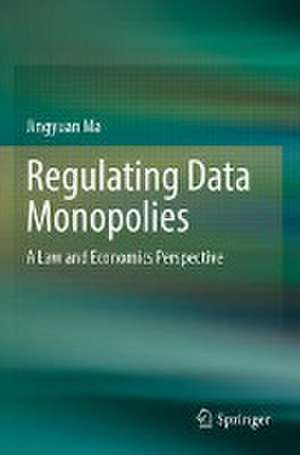Regulating Data Monopolies: A Law and Economics Perspective
Autor Jingyuan Maen Limba Engleză Paperback – 25 ian 2023
| Toate formatele și edițiile | Preț | Express |
|---|---|---|
| Paperback (1) | 733.49 lei 17-23 zile | +63.26 lei 6-12 zile |
| Springer Nature Singapore – 25 ian 2023 | 733.49 lei 17-23 zile | +63.26 lei 6-12 zile |
| Hardback (1) | 894.46 lei 43-57 zile | |
| Springer Nature Singapore – 24 ian 2022 | 894.46 lei 43-57 zile |
Preț: 733.49 lei
Preț vechi: 965.12 lei
-24% Nou
Puncte Express: 1100
Preț estimativ în valută:
140.40€ • 152.55$ • 118.01£
140.40€ • 152.55$ • 118.01£
Carte disponibilă
Livrare economică 26 martie-01 aprilie
Livrare express 15-21 martie pentru 73.25 lei
Preluare comenzi: 021 569.72.76
Specificații
ISBN-13: 9789811687686
ISBN-10: 9811687684
Pagini: 241
Ilustrații: XXI, 241 p. 10 illus., 8 illus. in color.
Dimensiuni: 155 x 235 mm
Greutate: 0.41 kg
Ediția:1st ed. 2022
Editura: Springer Nature Singapore
Colecția Springer
Locul publicării:Singapore, Singapore
ISBN-10: 9811687684
Pagini: 241
Ilustrații: XXI, 241 p. 10 illus., 8 illus. in color.
Dimensiuni: 155 x 235 mm
Greutate: 0.41 kg
Ediția:1st ed. 2022
Editura: Springer Nature Singapore
Colecția Springer
Locul publicării:Singapore, Singapore
Cuprins
Chapter 1. Introduction
Chapter 2. The form of Data Monopoly
Chapter 3. Defining Relevant Market for Data Monopoly
Chapter 4. Entry Barriers of Data Monopoly
Chapter 5. Abuse of Dominant Position
Chapter 6. The Impact on Consumer Welfare
Chapter 7. Conclusions
Notă biografică
Dr. Jingyuan Ma is Assistant Professor of Law at Central University of Finance and Economics in Beijing, China. Jingyuan holds an LLM in Law and Economics from the University of Hamburg and the University of Ghent (2010), and a BA in Economics from Beijing Foreign Studies University (2009). She obtained her PhD from the University of Hamburg, Erasmus University Rotterdam and the University of Bologna, taking part in the European Doctorate in Law and Economics programme (EDLE). Her teaching and research interests include comparative law, economic analysis of competition law, and law and society in East Asia. She has authored a monograph and several articles on comparative perspectives of competition policy in the USA, the EU, and China.
Textul de pe ultima copertă
This book analyzes the business model of enterprises in the digital economy by taking an economic and comparative perspective. The aim of this book is to conduct an in-depth analysis of the anti-competitive behavior of companies who monopolize data, and put forward the necessity of regulating data monopoly by exploring the causes and characteristics of their anti-competitive behavior. It studies four aspects of the differences between data monopoly and traditional monopolistic behavior, namely defining the relevant market for data monopolies, the entry barrier, the problem of determining the dominant position of data monopoly, and the influence on consumer welfare. It points out the limitations of traditional regulatory tools and discusses how new regulatory methods could be developed within the competition legal framework to restrict data monopolies. It proposes how economic analytical tools used in traditional anti-monopoly law are facing challenges and how competition enforcement agencies could adjust regulatory methods to deal with new anti-competitive behavior by data monopolies.
Caracteristici
Studies the relationship between big data and competition law at the theoretical level
Analyzes the economic reasons for the formation of data economy
Proposes what specific explanations and improvements Anti-monopoly Law should make on issue of regulating data monopoly
Analyzes the economic reasons for the formation of data economy
Proposes what specific explanations and improvements Anti-monopoly Law should make on issue of regulating data monopoly
